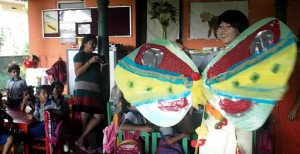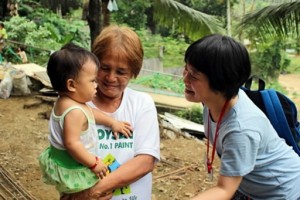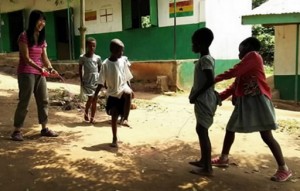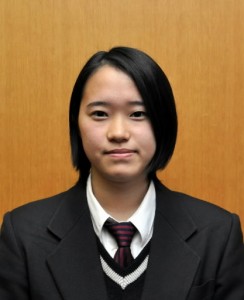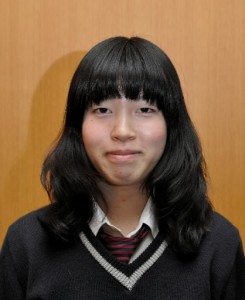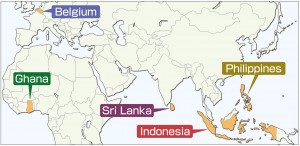Peace Seeds: Teens in Hiroshima Sow Seeds of Peace (Part 38)
Nov. 17, 2016
Part 38: High school students serve as volunteers overseas
In Hiroshima, there are high school students who have taken part in volunteer activities abroad. Facing such realities as poverty and economic disparity in developing countries, they are doing their best to assist children there by providing food and supporting their education.
Young people who were born and raised in Japan tend to take the social infrastructure for granted, including things like food, clothing, housing, and electricity and water services. But when they visit developing nations in Asia and Africa, they are surprised at the relative lack found in such conditions, recognizing the gap that exists in the standard of living between Japan and some countries abroad.
At the same time, they also moved by the fact that the local people live happily in societies where the social environment is not as well maintained. They come to understand that “material wealth isn’t the only measure for gauging happiness.” When these young people from Japan are able to learn through their interactions without the use of Japanese, naturally making mistakes along the way, it seems they reflect on their own lives and gain a new, compassionate perspective toward others.
To pursue such activities abroad, there are ways of obtaining government grants that require no repayment. We hope more young people will decide to pursue this path of lending support to others overseas.
Natsuko Ohata performs a puppet play for children in Sri Lanka
Natsuko Ohata, 17, is a second-year student at Onomichihigashi High School, located in the city of Onomichi. She said, “I wanted to help children in developing countries have dreams.” This past July, she served as a child care volunteer in Sri Lanka for a month.
Ms. Ohata wants to become a kindergarten teacher. At a kindergarten in Sri Lanka, she performed a puppet play, in English, titled “The Hungry Green Caterpillar.” She made the puppets herself. In the puppet play, she performed a scene where the caterpillar turns into a butterfly. Just as the green caterpillar grew to become a beautiful butterfly after eating plenty of food, she hopes the children will be able to realize their dreams after undergoing a variety of experiences.
Through her experience as a volunteer in Sri Lanka, Ms. Ohata came to the keen realization that material wealth does not necessarily equal spiritual wealth. During her stay there, she asked around 40 local people how happy they were, based on a percentage. The average of the responses was 97 percent, an unexpectedly high percentage. Ms. Ohata said, “People there take showers with cold water. And I was surprised when sometimes the water would just stop. But the local people still lived with smiles on their faces.”
Ms. Ohata also learned that it is important to lend support to local people after first studying what their needs are, rather than this “help” coming from the perspective of Japanese people. She said that she hopes to return to Sri Lanka again, after learning more English, and contribute even more to the people there. (Kana Okino, 16)
Rion Inoue provides meals for the underprivileged in the Philippines
Surrounded by the beautiful blue sea, Cebu Island is a resort destination in the Philippines. But on the island, a 30-minute drive leads to a shantytown where the underprivileged live. Rion Inoue, 17, a second-year student at Onomichihigashi High School, located in the city of Onomichi, took part in an NGO-led activity to provide meals for children there, for three weeks starting in late July. She was interested in helping to bridge the gap between the resort area and the areas of poverty on the island.
Ms. Inoue visited such places as a slum in a graveyard and a community composed of people who were forced to leave behind their mountain village because of development in the town. She found that they lived in shabby huts made of discarded materials and sheets of zinc, with most people unable to find work and forced to eke out a day-to-day existence. She saw a 14-year-old mother living on the streets and drug addicts whose eyes were blank.
In addition to helping make meals for 60 to 70 people, Ms. Inoue taught English and showed how to make things with origami paper. She said, “They were more impoverished than I had expected. The sanitary conditions were bad as well.” She also found that the residents had grown accustomed to always relying on assistance. A piece of origami she folded with a child was simply tossed onto the ground.
In the future, Ms. Inoue hopes to become a public health nurse. She said, “I’d like to help improve sanitary conditions in developing countries and support underprivileged women to advance socially.” (Miki Meguro, 13)
Kiri Aoyama lends support to elementary school in Ghana
Kiri Aoyama, 17, a second-year student at Hiroshima Jogakuin High School, located in Naka Ward, Hiroshima, served as a volunteer in Ghana for one month from July 10. Recalling her experience, she said, “It’s important to study English and do your best to convey your ideas.”
Ms. Aoyama took part in a program in a town lying about 50 kilometers north of Accra, the capital. She found that conditions for education at an elementary school there were poorly maintained. For example, the desks were shabby and made a rattling sound when touched. The library only had book shelves on one wall. So she lent her support to improving these conditions by painting the walls of the school building and making desks and book shelves.
Ms. Aoyama was given time in the classroom to tell children about drinking safe water and coping with injuries, using English, an official language in Ghana. But she felt frustrated at being unable to convey her messages well with her limited English ability. She also found communication difficult with the other volunteers from Western nations. Although they were able to express their ideas clearly, Ms. Aoyama struggled.
While this language barrier with others caused some chagrin, she still felt motivated by the children who ran up to her each day after spotting her face. She said, “All the children were very friendly and looked happy to be in school.” Making use of this experience as a springboard, she hopes to become involved in development issues facing such nations. She would like to work for programs like this, in English, in the future. (Chiaki Yamada, 17)
Ayumi Okamoto uses paper cranes to convey Hiroshima in Belgium
Ayumi Okamoto, 19, a third-year student at Funairi High School, located in Naka Ward, Hiroshima, studied in Belgium from August 2015 to July 2016. Ms. Okamoto proposed to an NGO that she teach others how to make origami paper cranes and share Japanese culture. For five days in February, she had the opportunity to show children in Belgium how to fold these cranes.
Ms. Okamoto said, “I was thinking I should convey the history of Hiroshima to other people in the world. So I showed how to make the paper cranes after introducing the story of Sadako Sasaki, the Japanese girl who died at the age of 12 as a result of A-bomb-induced leukemia. I was glad to see the children listening keenly to the story.”
She hopes to continue sharing her ideas while respecting the opinions of others, helping to build a world where people can understand one another regardless of nationality. (Kana Okino, 16)
Riko Okada engages with children in Indonesia
Riko Okada, 19, a third-year student at Funairi High School, located in Naka Ward, Hiroshima, studied in Indonesia for one year from August 2014. Ms. Okada worked as a volunteer worker for one day at a children’s facility in the capital city of Jakarta.
Ms. Okada took part in activities like drawing pictures and reading picture books. Many of the children there had trouble speaking due to illness, so, at first, she was unsure how to communicate with them. But after a little while, as the children smiled at her, her anxiety eased.
She also experienced safety concerns. When she returned to the car she used on that day, she discovered that the window was broken and the belongings in the car had been stolen. Despite this experience, she hopes to pay another visit to Indonesia as a university student in order to learn about the culture there more deeply. (Maiko Hanaoka, 18)
Volunteering abroad: Positive points and needed mindset
What are the positive points of working overseas as a volunteer and what sort of mindset is needed for these activities? We considered these questions in light of the stories we heard from these five young people.
Serving as a volunteer overseas provides us with the opportunity to learn about the real conditions and sense of values in that nation. It also offers ties of friendship beyond national borders and inspiration for possible future work.
Even when our language ability, like our ability to speak English, is inadequate, we still must have the courage to speak up and express ourselves. When serving overseas as a volunteer, we must also remember to be mindful of our safety. And after returning to Japan, it is a good idea to share your experience with other people by holding a reporting session. (Terumi Okada, 15, and Tokitsuna Kawagishi, 15)
Junior writers’ impressions
I took part in all the interviews and discussions for this theme. I was amazed to learn that all the people we met had initiated their activities on their own and peered into the future, too, not satisfied with only the fact that they had served as volunteers overseas. I really admire them, initiating these volunteer activities themselves and recalling their experiences so positively, with comments like, “It was a great experience. I enjoyed it, and the local people and I shared feelings of friendship.” I want to keep trying to do what I really want to do, no matter what. This was my last assignment for Peace Seeds. I was very happy that I was able to be involved in a range of reporting assignments. (Hanaoka)
I was really surprised to learn how young people of my generation are going overseas to enthusiastically serve as volunteers. At the same time, I felt my lack of experience. What Ms. Aoyama said during our interview now lingers in my heart. She said, “I’m determined to have my own opinion and express it in my own words.” I’d like to become a high school student who can act on my own initiative and do my very best. (Yamada)
This was the first time for me to hear about opportunities to study overseas that focus on volunteer activities. I myself have been overseas before, studying abroad to improve my language skills. But I was surprised to learn that some high school students are serving as volunteers in developing countries. That’s really admirable, I think. They decided themselves which country they should go to and they traveled there alone, staying for several weeks in places with harsh living conditions to lend support to the local people. It would be very hard for me to do the same thing. (Okada)
The people we interviewed were all high school students. It must have been hard to serve as a volunteer in a place where the language, culture, and values are different from Japan. But even so, they said with a smile, “I was really happy because the local people appreciated my work.” To me, they seemed so mature, not like others of my generation. I think they’re great, and I’d like to challenge myself in many ways, too, without feeling daunted. They inspired me to take action. (Okino)
I participated in the discussion where the junior writers discussed the positive points of volunteering overseas and the mindset that people need for their activities, based on the stories we heard from these five young people. I was most surprised by the fact that being poor doesn’t necessarily mean being unhappy. There are values we hold that are not always true. I learned that the stereotypes I have are different from reality and sometimes we need to let go of those stereotypes. If I have the chance, I’d like to take part in a volunteer activity overseas. (Kawagishi)
For this article, I took part in the meeting to decide the theme, but unfortunately I wasn’t able to help gather the information for the report. As I’d like to go overseas to serve as a volunteer and study abroad, I envy that they’ve already enjoyed this experience. And I think there are many young people who feel the same way. So I hope this article will help people visualize their dreams as the first step toward realizing them. (Anna Primus)
I had imagined that people in developing nations had hollow expressions, like the people we see on TV. But Ms. Inoue said that the poor people she met looked happy with their lives and were smiling. This surprised me and I realized that I had the preconception that because people in developing countries are poor, they’re not happy. To clear away these preconceptions, I’d like to go overseas, as Ms. Inoue recommended, and see that reality with my own eyes. I’m now interested in studying abroad. (Meguro)
What is Peace Seeds? Peace Seeds are the seeds of smiles which can be spread around the world by thinking about peace and the preciousness of life from various viewpoints. To fill this world with flowering smiles, 30 junior writers, from the first year of junior high school to the third year of senior high school, choose themes, gather information, and write articles.
(Originally published on November 17, 2016)
In Hiroshima, there are high school students who have taken part in volunteer activities abroad. Facing such realities as poverty and economic disparity in developing countries, they are doing their best to assist children there by providing food and supporting their education.
Young people who were born and raised in Japan tend to take the social infrastructure for granted, including things like food, clothing, housing, and electricity and water services. But when they visit developing nations in Asia and Africa, they are surprised at the relative lack found in such conditions, recognizing the gap that exists in the standard of living between Japan and some countries abroad.
At the same time, they also moved by the fact that the local people live happily in societies where the social environment is not as well maintained. They come to understand that “material wealth isn’t the only measure for gauging happiness.” When these young people from Japan are able to learn through their interactions without the use of Japanese, naturally making mistakes along the way, it seems they reflect on their own lives and gain a new, compassionate perspective toward others.
To pursue such activities abroad, there are ways of obtaining government grants that require no repayment. We hope more young people will decide to pursue this path of lending support to others overseas.
Natsuko Ohata performs a puppet play for children in Sri Lanka
Natsuko Ohata, 17, is a second-year student at Onomichihigashi High School, located in the city of Onomichi. She said, “I wanted to help children in developing countries have dreams.” This past July, she served as a child care volunteer in Sri Lanka for a month.
Ms. Ohata wants to become a kindergarten teacher. At a kindergarten in Sri Lanka, she performed a puppet play, in English, titled “The Hungry Green Caterpillar.” She made the puppets herself. In the puppet play, she performed a scene where the caterpillar turns into a butterfly. Just as the green caterpillar grew to become a beautiful butterfly after eating plenty of food, she hopes the children will be able to realize their dreams after undergoing a variety of experiences.
Through her experience as a volunteer in Sri Lanka, Ms. Ohata came to the keen realization that material wealth does not necessarily equal spiritual wealth. During her stay there, she asked around 40 local people how happy they were, based on a percentage. The average of the responses was 97 percent, an unexpectedly high percentage. Ms. Ohata said, “People there take showers with cold water. And I was surprised when sometimes the water would just stop. But the local people still lived with smiles on their faces.”
Ms. Ohata also learned that it is important to lend support to local people after first studying what their needs are, rather than this “help” coming from the perspective of Japanese people. She said that she hopes to return to Sri Lanka again, after learning more English, and contribute even more to the people there. (Kana Okino, 16)
Rion Inoue provides meals for the underprivileged in the Philippines
Surrounded by the beautiful blue sea, Cebu Island is a resort destination in the Philippines. But on the island, a 30-minute drive leads to a shantytown where the underprivileged live. Rion Inoue, 17, a second-year student at Onomichihigashi High School, located in the city of Onomichi, took part in an NGO-led activity to provide meals for children there, for three weeks starting in late July. She was interested in helping to bridge the gap between the resort area and the areas of poverty on the island.
Ms. Inoue visited such places as a slum in a graveyard and a community composed of people who were forced to leave behind their mountain village because of development in the town. She found that they lived in shabby huts made of discarded materials and sheets of zinc, with most people unable to find work and forced to eke out a day-to-day existence. She saw a 14-year-old mother living on the streets and drug addicts whose eyes were blank.
In addition to helping make meals for 60 to 70 people, Ms. Inoue taught English and showed how to make things with origami paper. She said, “They were more impoverished than I had expected. The sanitary conditions were bad as well.” She also found that the residents had grown accustomed to always relying on assistance. A piece of origami she folded with a child was simply tossed onto the ground.
In the future, Ms. Inoue hopes to become a public health nurse. She said, “I’d like to help improve sanitary conditions in developing countries and support underprivileged women to advance socially.” (Miki Meguro, 13)
Kiri Aoyama lends support to elementary school in Ghana
Kiri Aoyama, 17, a second-year student at Hiroshima Jogakuin High School, located in Naka Ward, Hiroshima, served as a volunteer in Ghana for one month from July 10. Recalling her experience, she said, “It’s important to study English and do your best to convey your ideas.”
Ms. Aoyama took part in a program in a town lying about 50 kilometers north of Accra, the capital. She found that conditions for education at an elementary school there were poorly maintained. For example, the desks were shabby and made a rattling sound when touched. The library only had book shelves on one wall. So she lent her support to improving these conditions by painting the walls of the school building and making desks and book shelves.
Ms. Aoyama was given time in the classroom to tell children about drinking safe water and coping with injuries, using English, an official language in Ghana. But she felt frustrated at being unable to convey her messages well with her limited English ability. She also found communication difficult with the other volunteers from Western nations. Although they were able to express their ideas clearly, Ms. Aoyama struggled.
While this language barrier with others caused some chagrin, she still felt motivated by the children who ran up to her each day after spotting her face. She said, “All the children were very friendly and looked happy to be in school.” Making use of this experience as a springboard, she hopes to become involved in development issues facing such nations. She would like to work for programs like this, in English, in the future. (Chiaki Yamada, 17)
Ayumi Okamoto uses paper cranes to convey Hiroshima in Belgium
Ayumi Okamoto, 19, a third-year student at Funairi High School, located in Naka Ward, Hiroshima, studied in Belgium from August 2015 to July 2016. Ms. Okamoto proposed to an NGO that she teach others how to make origami paper cranes and share Japanese culture. For five days in February, she had the opportunity to show children in Belgium how to fold these cranes.
Ms. Okamoto said, “I was thinking I should convey the history of Hiroshima to other people in the world. So I showed how to make the paper cranes after introducing the story of Sadako Sasaki, the Japanese girl who died at the age of 12 as a result of A-bomb-induced leukemia. I was glad to see the children listening keenly to the story.”
She hopes to continue sharing her ideas while respecting the opinions of others, helping to build a world where people can understand one another regardless of nationality. (Kana Okino, 16)
Riko Okada engages with children in Indonesia
Riko Okada, 19, a third-year student at Funairi High School, located in Naka Ward, Hiroshima, studied in Indonesia for one year from August 2014. Ms. Okada worked as a volunteer worker for one day at a children’s facility in the capital city of Jakarta.
Ms. Okada took part in activities like drawing pictures and reading picture books. Many of the children there had trouble speaking due to illness, so, at first, she was unsure how to communicate with them. But after a little while, as the children smiled at her, her anxiety eased.
She also experienced safety concerns. When she returned to the car she used on that day, she discovered that the window was broken and the belongings in the car had been stolen. Despite this experience, she hopes to pay another visit to Indonesia as a university student in order to learn about the culture there more deeply. (Maiko Hanaoka, 18)
Volunteering abroad: Positive points and needed mindset
What are the positive points of working overseas as a volunteer and what sort of mindset is needed for these activities? We considered these questions in light of the stories we heard from these five young people.
Serving as a volunteer overseas provides us with the opportunity to learn about the real conditions and sense of values in that nation. It also offers ties of friendship beyond national borders and inspiration for possible future work.
Even when our language ability, like our ability to speak English, is inadequate, we still must have the courage to speak up and express ourselves. When serving overseas as a volunteer, we must also remember to be mindful of our safety. And after returning to Japan, it is a good idea to share your experience with other people by holding a reporting session. (Terumi Okada, 15, and Tokitsuna Kawagishi, 15)
Junior writers’ impressions
I took part in all the interviews and discussions for this theme. I was amazed to learn that all the people we met had initiated their activities on their own and peered into the future, too, not satisfied with only the fact that they had served as volunteers overseas. I really admire them, initiating these volunteer activities themselves and recalling their experiences so positively, with comments like, “It was a great experience. I enjoyed it, and the local people and I shared feelings of friendship.” I want to keep trying to do what I really want to do, no matter what. This was my last assignment for Peace Seeds. I was very happy that I was able to be involved in a range of reporting assignments. (Hanaoka)
I was really surprised to learn how young people of my generation are going overseas to enthusiastically serve as volunteers. At the same time, I felt my lack of experience. What Ms. Aoyama said during our interview now lingers in my heart. She said, “I’m determined to have my own opinion and express it in my own words.” I’d like to become a high school student who can act on my own initiative and do my very best. (Yamada)
This was the first time for me to hear about opportunities to study overseas that focus on volunteer activities. I myself have been overseas before, studying abroad to improve my language skills. But I was surprised to learn that some high school students are serving as volunteers in developing countries. That’s really admirable, I think. They decided themselves which country they should go to and they traveled there alone, staying for several weeks in places with harsh living conditions to lend support to the local people. It would be very hard for me to do the same thing. (Okada)
The people we interviewed were all high school students. It must have been hard to serve as a volunteer in a place where the language, culture, and values are different from Japan. But even so, they said with a smile, “I was really happy because the local people appreciated my work.” To me, they seemed so mature, not like others of my generation. I think they’re great, and I’d like to challenge myself in many ways, too, without feeling daunted. They inspired me to take action. (Okino)
I participated in the discussion where the junior writers discussed the positive points of volunteering overseas and the mindset that people need for their activities, based on the stories we heard from these five young people. I was most surprised by the fact that being poor doesn’t necessarily mean being unhappy. There are values we hold that are not always true. I learned that the stereotypes I have are different from reality and sometimes we need to let go of those stereotypes. If I have the chance, I’d like to take part in a volunteer activity overseas. (Kawagishi)
For this article, I took part in the meeting to decide the theme, but unfortunately I wasn’t able to help gather the information for the report. As I’d like to go overseas to serve as a volunteer and study abroad, I envy that they’ve already enjoyed this experience. And I think there are many young people who feel the same way. So I hope this article will help people visualize their dreams as the first step toward realizing them. (Anna Primus)
I had imagined that people in developing nations had hollow expressions, like the people we see on TV. But Ms. Inoue said that the poor people she met looked happy with their lives and were smiling. This surprised me and I realized that I had the preconception that because people in developing countries are poor, they’re not happy. To clear away these preconceptions, I’d like to go overseas, as Ms. Inoue recommended, and see that reality with my own eyes. I’m now interested in studying abroad. (Meguro)
What is Peace Seeds? Peace Seeds are the seeds of smiles which can be spread around the world by thinking about peace and the preciousness of life from various viewpoints. To fill this world with flowering smiles, 30 junior writers, from the first year of junior high school to the third year of senior high school, choose themes, gather information, and write articles.
(Originally published on November 17, 2016)

